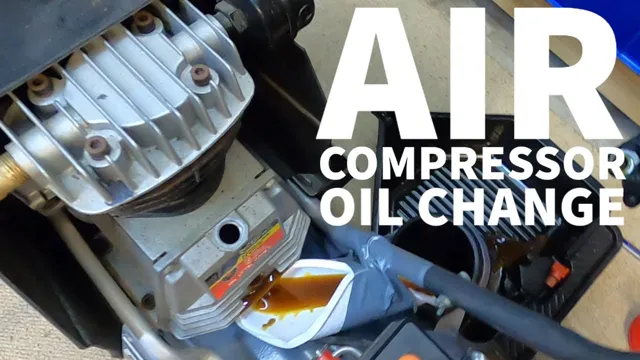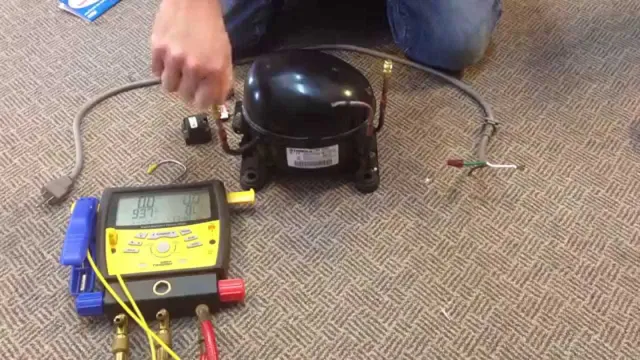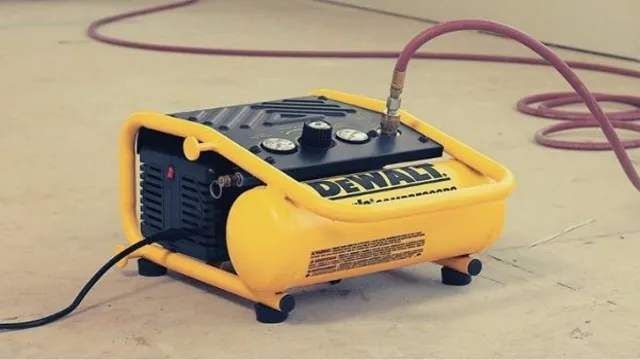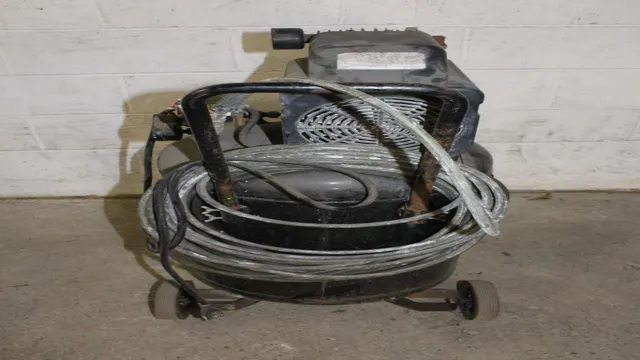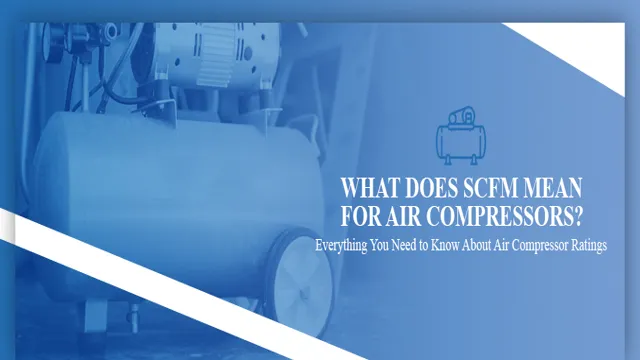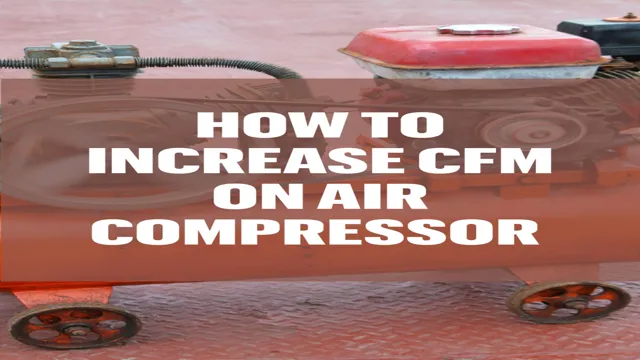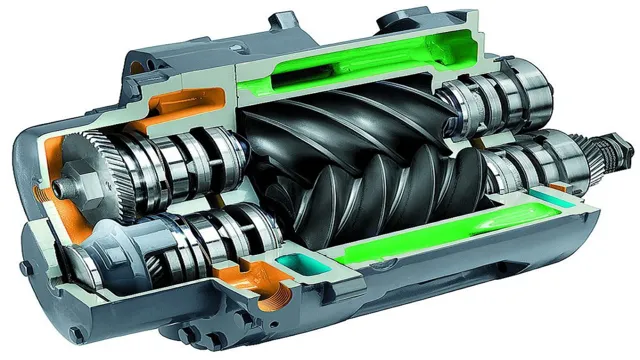Do I Need an Air Filter for My Air Compressor? Find Out Why You Definitely Do!
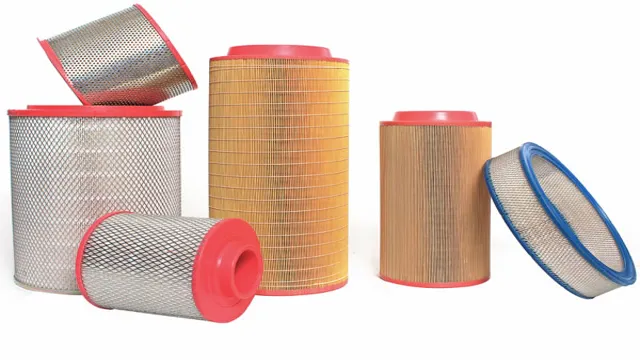
Have you ever wondered why your air compressor doesn’t perform as well as it should, even after regular maintenance? The answer lies in the air filter. Air compressors are a crucial tool in many industries, and they can accomplish impressive tasks. However, the air quality is central to its smooth operation.
Without a proper air filter, the air compressor might suck in dust, dirt and other particles, damaging the machinery and most importantly, the quality of the air output. So, the answer to the question, “Do I need an air filter for my air compressor?” is a resounding yes! In this blog, we’ll dive deeper into why air filters matter, what types of air filters are available, and how they can make a difference in your air compressor’s performance.
What is an Air Compressor?
An air compressor is a device that uses a motor to compress air and store it in a tank until it is required for use. They’re used in a variety of applications, from inflating tires to powering tools like drills, sanders, and nail guns. It’s important to remember that the quality of the air that enters the compressor tank can significantly impact the device’s performance, and that’s where an air filter comes in.
An air filter is an important component of the air compressor as it helps to eliminate contaminants such as dust, dirt, and oil that can clog the device and decrease its efficiency. Without an air filter, these particles can cause severe damage to the compressor’s motor and reduce its lifespan. So, if you’re wondering whether you need an air filter for your air compressor, the answer is a resounding yes.
It is an essential component that ensures your air compressor runs smoothly, efficiently, and lasts longer.
Why is an Air Filter Important for Your Air Compressor?
If you’re wondering whether you should invest in an air filter for your air compressor, the answer is a resounding yes. Air filters are crucial for keeping your compressor in good condition and ensuring that the air it pumps out is clean and free of contaminants. When air is drawn into your compressor, it carries dust, dirt, and other particles that can damage the compressor over time.
Without a filter to capture these substances, they can clog up the inner workings of the compressor and cause it to work less efficiently or break down entirely. An air filter helps to protect your investment and prolong the lifespan of your compressor. Plus, it keeps the air you breathe clean and healthy, which is especially important in industrial or workshop settings where pollutants can be prevalent.
So, if you’re asking yourself, “Do I need an air filter for my air compressor?” the answer is a definite yes.
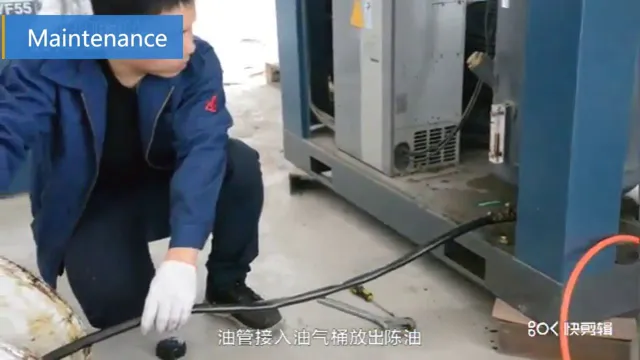
Protects Your Equipment from Dust and Debris
Air filter, air compressor, equipment, dust, debris. When it comes to your air compressor, protecting your equipment from dust and debris should be at the forefront of your mind. One of the easiest and most effective ways to accomplish this is by using an air filter.
An air filter works by trapping dust, dirt, and other debris before it has a chance to enter your compressor’s internal mechanisms, where it can cause significant damage. Without an air filter, these particles can build up over time and potentially cause your compressor to overheat or even break down completely. Think of it like wearing a mask when you’re in a dusty or dirty environment – it’s a simple yet critical way to protect your respiratory system.
The same applies to your air compressor. By using an air filter, you’re safeguarding your equipment and prolonging its lifespan, ultimately saving you time and money in the long run. So, if you haven’t already, invest in an air filter for your air compressor today and give your equipment the protection it deserves.
Helps Improve the Air Quality of Your Workspace
Having an air filter for your air compressor is crucial for maintaining the air quality in your workspace. Without an air filter, the compressor pulls in air with all sorts of pollutants, like dust, dirt, and debris, which can lead to a buildup of contaminants in your air compressor. These contaminants can cause damage to your compressor, affecting its functionality and reducing its lifespan.
Additionally, when you’re working in an environment with poor air quality, it can have negative effects on your health. That’s where an air filter comes in. It helps to remove these contaminants from the air, improving the air quality in your workspace and promoting a healthier environment.
By investing in an air filter for your air compressor, you’re not only helping to maintain the longevity of your equipment, but also enhancing the overall health and well-being of your workspace.
Prevents Contamination of Your Compressed Air
An air filter is an essential component of your air compressor system as it prevents contamination of the compressed air. When air is sucked into the compressor, it also sucks in dust, dirt, oil, and moisture from the surrounding area. These impurities can reduce the efficiency and lifespan of the compressor, and can also contaminate the final output.
Installing an air filter ensures that these impurities are removed before they enter the compressor. This results in clean, dry, and high-quality compressed air output. An air filter also improves the overall indoor air quality of your workspace by trapping harmful pollutants, allergens, and bacteria.
It’s important to choose the right air filter for your system to ensure maximum protection against impurities. Remember, a high-quality air filter not only protects your compressor, but also your health and the quality of your work.
What Happens if You Don’t Have an Air Filter for Your Compressor?
If you’re wondering whether you need an air filter for your air compressor, the answer is a resounding YES! Without an air filter, your compressor’s internal components will be subjected to dust, debris, and other contaminants, which will quickly cause damage and reduce the lifespan of your compressor. The purpose of an air filter is to trap these particles before they have a chance to enter the compressor, improving the quality of the compressed air and protecting the internal components from wear and tear. So, if you want your compressor to operate efficiently and last for years to come, investing in a good quality air filter is a must.
It’s a small investment that can save you a lot of money in the long run, and ensure that your compressor is always working at its best.
Buildup of Dust and Debris in Your Equipment
Air filter, compressor, buildup of dust and debris, equipment maintenance Air filters are an essential component of any compressor system. Without them, your equipment is susceptible to a buildup of dust and debris, which can cause serious damage to your compressor. The accumulation of dust and debris can clog important components such as valves, filters, and cooling systems, leading to a decrease in performance.
Over time, this buildup can lead to overheating, damage to the compressor, and ultimately, failure of the entire system. Air filters help to prevent this buildup by trapping airborne contaminants before they can damage your equipment. As such, it is critical to ensure that your air filter is changed regularly as part of your routine equipment maintenance.
Neglecting this small but important component could end up being a costly mistake in the long run. So, don’t let a lack of an air filter lead to the buildup of dust and debris and protect your compressor system.
Decreased Air Quality and Breathing Hazards
Air Filter for Compressor If you don’t have an air filter for your compressor, you’re putting yourself at risk of breathing hazards and decreased air quality. When air is compressed, contaminants like dust, oil, and moisture can accumulate and be pushed down the air line. Without a filter, these contaminants can make their way into your lungs, potentially causing respiratory issues.
Plus, they can cause damage to your equipment and the products you’re working on. It’s crucial to have an air filter in place to remove these harmful particles and ensure clean, safe air. Think of it like a strainer for your air system – just like how a strainer catches unwanted bits in your food, an air filter catches unwanted bits in your compressed air.
So, make sure to prioritize getting an air filter for your compressor to protect both yourself and your equipment.
Potential Contamination of Your Compressed Air
Compressed air is used in countless industrial and manufacturing applications to power tools, machinery, and equipment. However, this air can also carry harmful contaminants that pose a serious risk to human health and the environment. If you don’t have a proper air filter installed for your compressor, these contaminants can easily infiltrate the compressed air system and compromise the integrity of your products or processes.
Without a filter, your compressor can suck in dirt, dust, pollen, moisture, and other impurities that can damage your equipment and compromise the quality of your compressed air. This can lead to costly repairs, downtime, and safety hazards for workers. Therefore, it’s essential to invest in a high-quality air filter that can remove these harmful contaminants and ensure the purity and reliability of your compressed air system.
By keeping your air filter well-maintained and replacing it regularly, you can prevent potential contamination and ensure the optimal performance of your compressor.
Which Air Filter Should You Choose for Your Air Compressor?
If you use an air compressor, you might be wondering if you need an air filter. The short answer is yes, you do. Air filters are essential to prevent dust, dirt, and other small particles from entering your compressed air system.
But which air filter should you choose? There are two main types of air filters: particulate and coalescing filters. Particulate filters are designed to remove solid particles, while coalescing filters are designed to remove oil and water vapors. It’s important to choose the right filter for your needs.
Particulate filters work best for general purpose applications, such as woodworking, painting, or cleaning, while coalescing filters are necessary for more delicate applications, such as pharmaceutical manufacturing or electronics assembly. It’s also important to choose the right size and micron rating for your filter, depending on your compressor’s CFM and the level of filtration needed. In short, investing in a high-quality air filter is essential to prolong the life of your compressor and maintain the quality of your compressed air.
Consider the Size of Your Compressor and Airflow Needs
When it comes to air compressors, it’s important to consider the size of your compressor and the airflow needs before choosing an air filter. An undersized air filter can result in poor air quality, which can damage your equipment and harm your health. On the other hand, an oversized air filter can restrict airflow, reducing the efficiency of your compressor and increasing your energy costs.
That’s why it’s crucial to choose the right size and type of air filter based on your compressor’s specifications. A high-quality air filter can trap contaminants such as dust, dirt, and oil to ensure that the air your compressor intakes is clean and dry. This helps to improve the longevity of your equipment and reduce the risk of breakdowns.
So, be sure to choose an air filter that is compatible with your compressor’s size and airflow needs to ensure optimal performance.
Choose a Filter with a High Efficiency Rating
If you want to ensure that your air compressor is functioning at its best, choosing a filter with a high efficiency rating is crucial. The type of air filter you choose will determine the level of protection provided to your compressor and the quality of air produced. Filters with a high efficiency rating can trap even the smallest particles, ensuring that the air produced is free of contaminants.
This, in turn, protects your air compressor from potential damage caused by dust, debris, and other pollutants. When choosing an air filter, look for one with a MERV (minimum efficiency reporting value) rating of at least 8 or higher. A filter with a high MERV rating will catch more particles, providing optimal protection for your air compressor.
Don’t skimp on the quality of your air filter, as it can ultimately save you money by reducing the chance of costly repairs or downtime.
Select a Filter that Matches Your Specific Operating Conditions
When it comes to selecting an air filter for your air compressor, it’s essential to choose one that matches your operating conditions. Not all air filters are created equal, and choosing the wrong one can cause several problems, such as decreased efficiency, increased maintenance costs, and reduced lifespan of your compressor. To select the right air filter, you need to consider factors like air quality, temperature, humidity, and the operating environment of your compressor.
For example, if you’re working in a dusty or dirty environment, you need an air filter with a high filtration level, such as HEPA filters, to remove the smallest particles from the air. On the other hand, if you’re operating your compressor in a cold or humid environment, you need air filters that can handle extreme temperatures and humidity levels. Filters that can handle such challenging conditions are often made of materials like polypropylene or fiberglass.
Overall, selecting the right air filter for your air compressor can be a daunting task, but it’s an essential one for ensuring that your compressor operates efficiently and lasts as long as possible. By carefully considering your specific operating conditions and choosing a filter that matches them, you can ensure optimal performance, minimize maintenance costs, and extend the lifespan of your compressor.
Conclusion: Yes, It is Important to Have an Air Filter for Your Air Compressor
In summary, if you want to keep the air you breathe clean and healthy, then you definitely need an air filter for your air compressor. Without one, you run the risk of contaminating your workspace with all sorts of nasty particles. Think of it like a superhero outfit for your compressor – it may not look flashy, but it’s essential to keep the bad guys out! So, take a deep breath and invest in an air filter – your lungs (and anyone who shares your workspace) will thank you.
“
FAQs
What is the importance of having an air filter in my air compressor?
An air filter in your air compressor helps to prevent dust, dirt, and other particles from entering the system, which can cause damage to the compressor’s components or contaminate the compressed air output. Therefore, having an air filter can help to extend the compressor’s lifespan and improve the air quality of the output.
How often should I change my air compressor’s air filter?
It is recommended to change the air filter of your air compressor every 3 to 6 months, depending on the frequency of use and environmental conditions. If you notice a decrease in the compressor’s performance or air quality, it may be a sign that the air filter needs to be changed sooner.
Can I use any type of air filter in my air compressor?
It is important to use the recommended air filter for your specific air compressor model, as not all filters are compatible or effective. Using the wrong type of filter can lead to reduced performance, increased energy consumption, or even damage to the compressor’s components.
What are the signs of a clogged air filter in my air compressor?
Some signs of a clogged air filter include decreased airflow, increased pressure drop, higher energy consumption, and reduced compressor performance or output quality. If you notice any of these signs, it is recommended to check and clean or replace the air filter.
Do I need to clean the air filter of my air compressor regularly?
Yes, it is important to maintain the cleanliness and functionality of the air filter by cleaning it regularly. This can help to prevent clogging, extend the filter’s lifespan, and ensure optimal compressor performance. Refer to the manufacturer’s instructions for recommended cleaning procedures and frequency.
What happens if I run my air compressor without an air filter?
Running your air compressor without an air filter can lead to internal damage and contamination of the output air. This can cause increased wear and tear on the compressor’s components, reduced efficiency, and increased maintenance costs. Therefore, it is highly recommended to always use an air filter in your air compressor.
Can I reuse or wash my air compressor’s air filter?
It depends on the type of filter and the manufacturer’s recommendations. Some filters can be washed and reused, while others are disposable and should be replaced when clogged or dirty. Using a filter that is intended for one-time use or using a reusable filter beyond its recommended lifespan can lead to reduced performance and increased maintenance costs.

